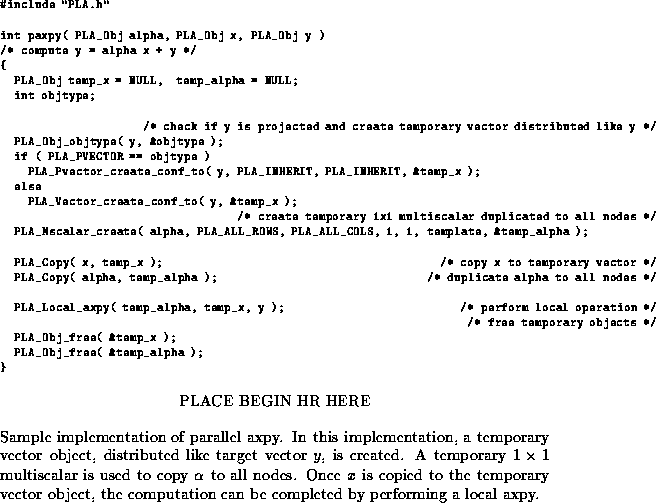Given two global vectors x and y in objects x and y,
and scaling factor ![]() in object alpha,
we wish to compute the scaled addition
in object alpha,
we wish to compute the scaled addition
![]()
If both x and y are of
object type vector and they are aligned identically to
the template, and alpha is a ![]() multiscalar
duplicated to all nodes,
then the result can be computed by
multiscalar
duplicated to all nodes,
then the result can be computed by
![]()
Thus, in this situation it suffices to call the local axpy routine on the local data.
If x and y are not distributed as vectors
and/or ![]() is not available on all nodes,
one approach is to create two temporary vectors
that are aligned
and a
is not available on all nodes,
one approach is to create two temporary vectors
that are aligned
and a ![]() multiscalar duplicated
to all nodes, copy x , y , and
multiscalar duplicated
to all nodes, copy x , y , and ![]() into the
temporary vectors and multiscalar, and execute the above described procedure
for aligned vectors. The code would look similar to that given for
parallel inner product in Figure
into the
temporary vectors and multiscalar, and execute the above described procedure
for aligned vectors. The code would look similar to that given for
parallel inner product in Figure ![]() .
.
We instead illustrate an alternative to the above approach,
which redistributes the object x
like
the output object y, before local operations proceed
(Figure ![]() ).
In the code given in that figure,
).
In the code given in that figure,
![]() , x , and y are passed to the routine
as objects alpha, x, and y.
The first is a
, x , and y are passed to the routine
as objects alpha, x, and y.
The first is a ![]() multiscalar.
The last two we assume are vectors, possibly projected
and/or duplicated.
We now create a temporary object,
temp_x, of object
type vector and distributed like the output object y.
We also create temp_alpha, a
multiscalar.
The last two we assume are vectors, possibly projected
and/or duplicated.
We now create a temporary object,
temp_x, of object
type vector and distributed like the output object y.
We also create temp_alpha, a ![]() multiscalar duplicated
to all nodes, so that all nodes will have a local
copy of the scaling factor.
Next, we copy x to temp_x
and alpha to temp_alpha and a local
axpy operation completes the necessary computation.
multiscalar duplicated
to all nodes, so that all nodes will have a local
copy of the scaling factor.
Next, we copy x to temp_x
and alpha to temp_alpha and a local
axpy operation completes the necessary computation.
PLACE BEGIN HR HERE

PLACE END HR HERE